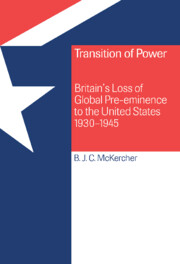Book contents
- Frontmatter
- Contents
- Acknowledgments
- List of abbreviations
- Prologue: Power and purpose in Anglo-American relations, 1919–1929
- 1 The end of Anglo-American naval rivalry, 1929–1930
- 2 The undermining of war debts and reparations, 1929–1932
- 3 Disarmament and security in Europe and the Far East, 1930–1932
- 4 The unravelling of co-operation, 1932–1933
- 5 Moving away from the United States, 1933–1934
- 6 Britain, the United States, and the global balance of power, 1934–1935
- 7 From Abyssinia to Brussels via London, Madrid, and Peking, 1935–1937
- 8 Appeasement, deterrence, and Anglo-American relations, 1938–1939
- 9 Belligerent Britain and the neutral United States, 1939–1941
- Epilogue: ‘A new order of things’, 1941–1945
- Select Bibliography
- Index
7 - From Abyssinia to Brussels via London, Madrid, and Peking, 1935–1937
Published online by Cambridge University Press: 15 July 2009
- Frontmatter
- Contents
- Acknowledgments
- List of abbreviations
- Prologue: Power and purpose in Anglo-American relations, 1919–1929
- 1 The end of Anglo-American naval rivalry, 1929–1930
- 2 The undermining of war debts and reparations, 1929–1932
- 3 Disarmament and security in Europe and the Far East, 1930–1932
- 4 The unravelling of co-operation, 1932–1933
- 5 Moving away from the United States, 1933–1934
- 6 Britain, the United States, and the global balance of power, 1934–1935
- 7 From Abyssinia to Brussels via London, Madrid, and Peking, 1935–1937
- 8 Appeasement, deterrence, and Anglo-American relations, 1938–1939
- 9 Belligerent Britain and the neutral United States, 1939–1941
- Epilogue: ‘A new order of things’, 1941–1945
- Select Bibliography
- Index
Summary
Japan had a strong appetite and it would be difficult to stop that policy in this way, more so as now Japan was perhaps not so afraid of America as she had been. All evidence shewed that the United States was withdrawing more and more into its own shell.
Vansittart, October 1935In the two-and-a-half years following the conclusion of the Anglo-German naval agreement, the Locarno and Washington treaties joined the war debts and reparations agreements on the diplomatic scrap heap. These changes resulted from Hitler, Mussolini, amd militarist Japanese leaders working to alter the European, Mediterranean, amd Far Eastern balances in their favour. British perceptions of the United States, based on the lessons drawn from the bilateral relationship, affected London's general global policy in the period 1935–7. The same was true for Washington. In this, there was discordance. As the DRC showed, the British thought about external policy chiefly in political and military terms, doing so in relation to the competing interests of other Powers. For Americans, or at least those who thought in terms of global policy, Britain presented the primary difficulty. Wherever they looked, they saw Britain – blocking access to raw materials, air routes, cable networks; involving itself deeply in Venezuelan oil and investment in Argentina; seeking to control access to Middle Eastern oil; regulating threequarters of world rubber production. In the Far East, the State Department remained convinced that British policy was designed to enlist American aid to protect British investments in China against the Japanese. In Europe, they saw Britain working to maintain the continental balance, even though this sometimes meant compromising with the enemies of democracy, like fascist Italy, in the interests of the City of London.
- Type
- Chapter
- Information
- Transition of PowerBritain's Loss of Global Pre-eminence to the United States, 1930–1945, pp. 216 - 247Publisher: Cambridge University PressPrint publication year: 1999

